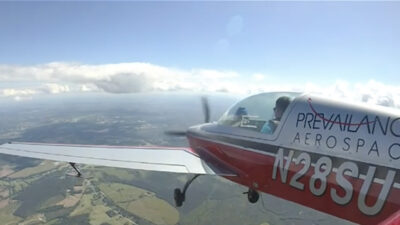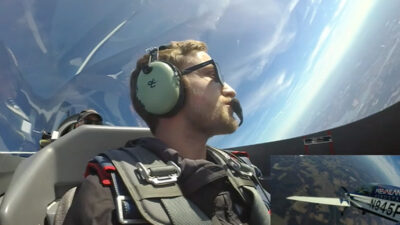Are You Committed to Excellence or Minimum Standards?

When was the last time an aviation colleague asked you (or you asked yourself), “Is this good enough?” And what does “good enough” really mean? In my opinion, the very question constitutes an attitude of mediocrity.
The real question for true aviation professionals should be: “Is good enough ever really good enough in any business or private aviation pursuit?” So many times, we use the descriptive phrases “world-class,” “best-in-class” and “excellence.” But do we really mean them, or are they simply “ear candy” because they sound good?
In the realm of professional aviation, each of us carries a mantle of tremendous responsibility for the other souls with whom we share the airspace, our families and colleagues, our companies and employers and, of course, ourselves.
The consequences of a serious misstep in our profession can have a finality that renders meaningless the statement, “I will do better next time.” Given those stakes, to what level of performance should we aspire? Perfection? No, by definition, perfection is simply unreachable.
Defining Aviation Excellence
One of the highlights of this concept of excellence is that it can be applied to each and every one of our roles in aviation—as maintenance technicians, flight crew members, schedulers and dispatchers, business office specialists and leaders.
Excellence vs. Minimums
The unfortunate reality is that aviation operational standards have been put forth as minimum standards. As you already know, this terminology is in standard usage for everything from FBO leases with the local airport authority to pilot type ratings for today’s most sophisticated business jets.
The acceptance of the “minimum standards” concept has helped perpetuate a culture of minimum performance that seeps into virtually every aspect of aviation. And when you consider the deadly consequences of a misstep, don’t you find it ironic that “minimum” and “standards” are used together in the context of “performance” and “safety”?
Here is a true story. Recently, I was at one of our industry’s leading training facilities. There were about a dozen full-motion simulators booked around the clock. The classrooms were fully outfitted with the latest interactive learning tools. And there was a top-notch resource library staffed by a pair of professional librarians, eager to help with any conceivable research request.
Over lunch, the question from one of my classmates to the instructor went something like this:
“I’m supposed to be here for five days, but do you think I can skip the LOFT and be out of here in four days? And, if we could double up a day, can we check all of the boxes (61.58 check) in three days? What’s the minimum that I really have to do?”
For those who’ve completed a few years of recurrent training, I’m sure that conversation sounds pretty familiar.
But when the instructor started probing to gauge the student’s true level of understanding (systems, performance, etc.), the student got resistant and asked, “What’s the minimum that I need to know?”
What Is Excellence, Really?
If we truly think of ourselves as aviation professionals, what level of performance comes along with earning that title? I argue that it is defined by excellence.
That means having a profound understanding of all the relevant subjects in your area of focus. It also means understanding all of the whys—not just the hows.
And finally, it means being able to mentor, teach and communicate your invaluable understanding and experiences to those individuals who are in the developmental years of their careers.
I believe each of us in an aviation organization should be a leader. It is up to us to set the standards of aviation excellence and mastery, first for ourselves and then to influence the adoption of those standards throughout each functional area in our respective organizations.
It’s not easy. Without a doubt, the performance bar to reach “excellence” is ever higher.
As we learn more and perform at higher levels, the horizon of possibility and performance will always stretch out in front of us—just a little out of reach.
But as we learn more, we understand more. And as we understand more, we become more valuable to our organizations. When that happens on a consistent basis, business aviation can create more quantifiable value for our host organizations.
When we attain that level of excellent performance, the sustainability of the business aviation function is within reach. But the quest for excellence and mastery must continue all the same.
Good Enough?
Now, back to that opening question: “Is just ‘good enough’ ever really ‘good enough’?”
Well, one thing is for certain: “Good enough” definitely isn’t excellence! And, if it isn’t excellence we’re aiming for, can we rightfully refer to ourselves as “aviation professionals”?
After all, excellence is the cornerstone of aviation professionalism.

Gray Stone Advisors combines their experience both in leading businesses as well as business aviation operations to provide flight department leaders with proven strategies for excellence.
https://www.graystoneadvisors.com/
© 2024 Gray Stone Advisors. All Rights Reserved.
Next ArticleRelated Posts

Three Considerations That Set Pilots Up for Success
Constantly reviewing aviation accidents and incidents is challenging. As an instructor, it is not only the injuries and fatalities that make it hard, but the sheer magnitude of avoidable aspects of each incident. These safety reports prove that every Pilot in Command (PIC) is accountable for what transpires.

The Denominator Is not Common
When was the last time you identified the “goods” and “others” of any given event to improve efficiency and effectiveness? If it’s been a while, bring these words back into your daily routine. There is merit in shared experiences and the refinement of small nuances to create significant value. No organization or person in it is perfect.

